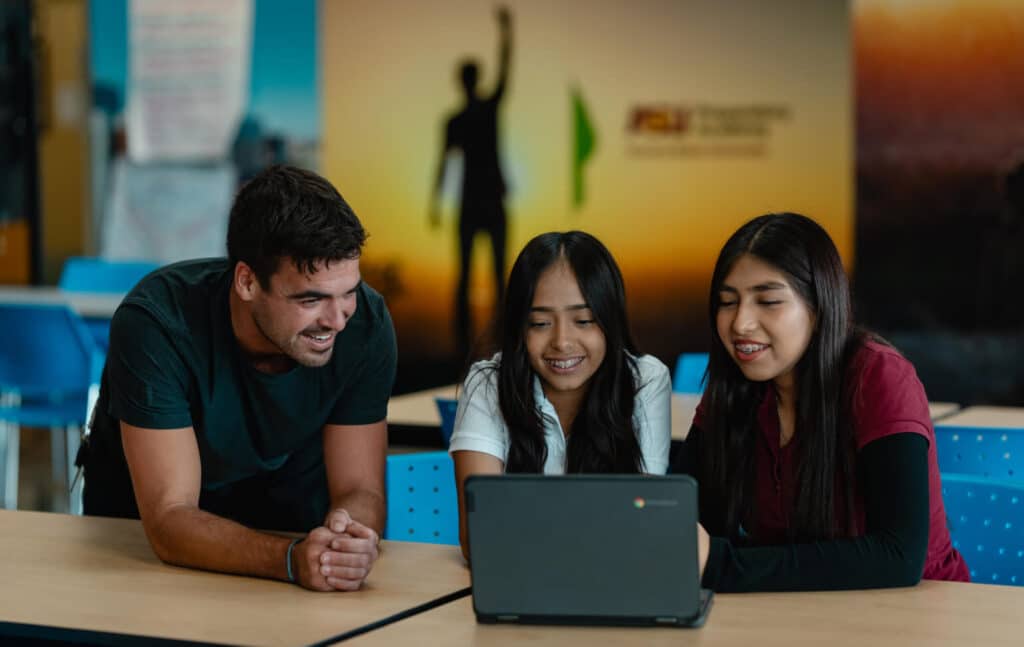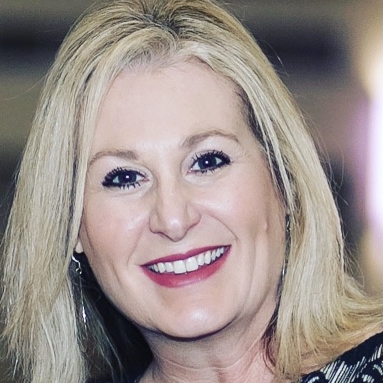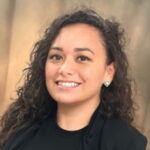Transformational Teacher Leader program at ASU Prep
Summary
ASU Preparatory Academy Transformational Teacher Leaders (TTL) firmly believe all kids can. They embody the ASU Prep mission and core values, lead by example, make data and research-based decisions, implement innovative techniques, take risks, and foster collaboration throughout the entire school community. In this new teacher leadership role, TTLs will be both teachers and leaders, allowing us to keep our best teachers in the classroom but giving them opportunities to rise as instructional leaders on their campuses. A major advantage of this advancement track is that teachers who love teaching but are seeking more responsibility can have the best of both worlds.

Classrooms transform with Teacher Leaders
Transformational Teacher Leaders are tasked to provide professional development in response to site-based needs, coach teachers to help them build capacity in student-centered learning, and provide constructive feedback through observations. TTLs are also leading professional learning communities to explicitly model and teach how to use student data to make informed classroom decisions. Teachers’ instructional practice will improve by having quality mentors who are regularly accessible and present in their classrooms rather than relying on a district consultant who cannot commit to daily interactions.
Raising student achievement
The main goal of the TTL program is to raise student achievement for all learners by creating a positive school culture that thrives on relationships, continuous improvement, and high expectations.
TTLs are guided and measured by four essential questions:
- How am I positively contributing to my school’s mission in alignment with my site leadership?
- How am I fostering a dynamic team that is built on trust?
- How am I prioritizing data-driven decision-making to ensure that student achievement remains the focal point of all campus initiatives?
- How am I building teacher capacity in student-centered learning and instructional practice empowerment through effective coaching strategies?
- Ongoing trainingTTLs met in January to continue developing skills to be successful in this role. They will continue on-going training throughout the rest of the school year and into the summer of 2025.
- Bringing PI practices back to campusesIn November 2024, the TTL and site leaders of ASU Prep Pilgrim Rest attended THRIVE Collective, a retreat for learning PI tools and practices. Not only do TTLs bring these new skills to bring back to their campus, we are encouraging TTLs to share what they’ve learned with their communities of practice.
- Evaluating student achievement dataIn May 2025 we will receive the scores from Arizona state testing for grades 3rd-11th. We will compare student achievement data from last year to see how TTLs are impacting teacher growth and student learning.
- TTL impact on teacher evaluationsClassroom teachers will submit teaching portfolios as part of the end-of-year evaluation in May 2025. They have to select four teaching practices, document evidence/student artifacts from the classroom, and reflect on what they have learned throughout the year. We will compare teacher evaluation scores from last year to this year to measure how TTLs have impacted teachers through coaching and classroom observations.
It’s important for me to step out of my comfort zone and challenging myself. This aligns closely with the performance character domain, as it requires resilience, adaptability, and a commitment to personal and professional growth. Embracing new challenges and responsibilities pushes me to develop as a leader and helps me better support teachers and bridge the gap between educators and administration. It’s motivating to know that by challenging myself, I’m contributing to a stronger school community.
Ally Glow, TTL
Recent updates
TTL kicks off ASUPrep all-staff meeting
To kick off the school year at the ASU Prep’s 850-person All Staff meeting, Executive Director of Secondary Academics Michael Franklin introduced the TTL role by telling a story about a teacher who was seeking leadership opportunities but did not want to leave the classroom. Then, three TTLs were introduced and shared a piece of the work that they were excited to start at their campuses this school year.
Prepping for the school year
During teacher return week in the summer, TTLs were responsible for beginning-of-the-year professional development, met with their teacher teams, and helped site leaders prepare for the first day of school.
Aligning TLLs with ‘Project Momentum’
TTLs worked together at the October retreat to prepare professional development on PLC topics that aligned with the Project Momentum framework, a grant funded by Arizona Department of Education. Site leaders selected an area of need at their campus, such as boosting student engagement, using backward design to lesson planning, or using a protocol to guide data talks. TTLs prepared materials and delivered the content to teachers.
At their January retreat, TTLs spoke with Betsy Fowler, ASU Prep’s Head of Schools, to learn about the next year’s school initiatives on mastery and modernizing learning in the classroom. TTLs used this time to kick off a design session, being proactive about next steps to ensure that their fellow teachers felt prepared for system changes.

A key principle motivating the work of a TTL is the value of collaborative leadership, rooted in the civic and performance character domains. The TTL role emphasizes the importance of shared responsibility in fostering a thriving educational environment. By working closely with teachers, the TTL models accountability, mutual respect, and a commitment to continuous improvement.
Laura Grunewald TTL
TTLs exemplify PI practices
Understand culture and context
Before TTLs will be able to accelerate student learning and achievement, they must first build a positive culture by connecting with ASU Prep teachers, staff, and administrators. They must engage in relationship building in order to hear everyone’s story and understand the diverse and complex educational stories that encompass the campus environment. By attending a community of practice and in-person retreats, TTLs are learning how to use PI to make those connections, ensuring that people within the organization are valued as humans first before taking on difficult work.
Design creative solutions
TTLs guide teachers in how to implement ASU Prep’s student-centered learning models, which emphasize personalized pathways so that students can be set up for future college and career success. Designing a personalized classroom is challenging, especially when you consider the possibility that a single teacher may be planning for a cohort of 100+ students who may all have different needs or foundational gaps in knowledge. TTLs can help teachers design an equitable classroom by supporting them to leverage student data through technological tools in order to implement a blended learning model. During PLCs, TTLs can also guide decision-making on how to access, design, or select the best instructional strategies to support all student needs.
Principled Innovation guides the program’s design
Improving communication and balancing multiple interests
People involved in the TTL project have expressed frustration over errors or lack of communication about the role of transformational teacher leader. The people who originally designed the TTL role had a clear vision of it, but over time, other leaders responsible for disseminating information about it have sometimes described it differently. For instance, while this role is described as “quasi-administrative,” it is primarily designed to support instruction by distributing expertise among various site leaders. When TTLs report non-instructional tasks being assigned to them, such as student scheduling typically handled by an academic counselor, frustration can arise because these tasks detract from their primary instructional priorities. It appears that everyone feels pressure to check off items on a task list rather than focusing on tasks that address the highest priorities.
Although schools exist to educate students, compliance items, such as monthly fire drills, often take precedence over instruction. This balance is challenging, as student safety is as critical as student learning. Ultimately, a solution could be to more clearly define responsibilities and emphasize that TTLs’ expertise is rooted in instruction. We intend for PI to continue guiding the design of this program so that the role becomes more clarified, achievable and beneficial for TTLs. This will reduce the risk of burnout.

Supporting 3,400+ total immersion students
Despite being in early development, the TTL program supports work across ASU’s eight campuses. The program launched in July 2024 with a week-long retreat, where returning employees and newly hired TTLs explored the role, its alignment to ASU Prep’s core values and mission, and ways to approach positive leadership. Throughout the retreat, the PI approach guided relationship building and reflective questioning. TTL retreats continued in October of 2024 and January 2025.
TTLs come together once a month as a Community of Practice to share how the role is evolving at their site, how they are connecting with teachers, and how they are helping to support school and network initiatives. All 177 ASU Prep teachers are assigned to a TTL for coaching and observational support.
-

Teachers need support with their instruction that comes from someone who is non-evaluative. They need to be able to have open and honest conversations surrounding data and instruction. People who evaluate them oftentimes, do not have the relationships that this work requires.
Rae Lynn Estrada Bond -

TTL divides leadership responsibilities among more individuals, freeing up different leaders to work more intentionally within the roles they are meant to occupy, and allowing for more input in collaboration. This should contribute to greater successes for our students.
Matthew Cardoza -

TTL divides leadership responsibilities among more individuals, freeing up different leaders to work more intentionally within the roles they are meant to occupy, and allowing for more input in collaboration. This should contribute to greater successes for our students.
Marylin Monroy -

The TTL initiative is important because it allows individuals with the most intimate knowledge to best serve the needs of their specific students and teachers, with whom there is a genuine connection. As TTLs, we also know we have a greater impact than just the students we personally reach. This is a particularly satisfying feeling.
Lisa Mills -

The TTL brings everyone together as a supportive community. Teachers have someone who is able to see what others are doing or needing, and with whom they can collaborate with on their practice.
Holly Cartright


